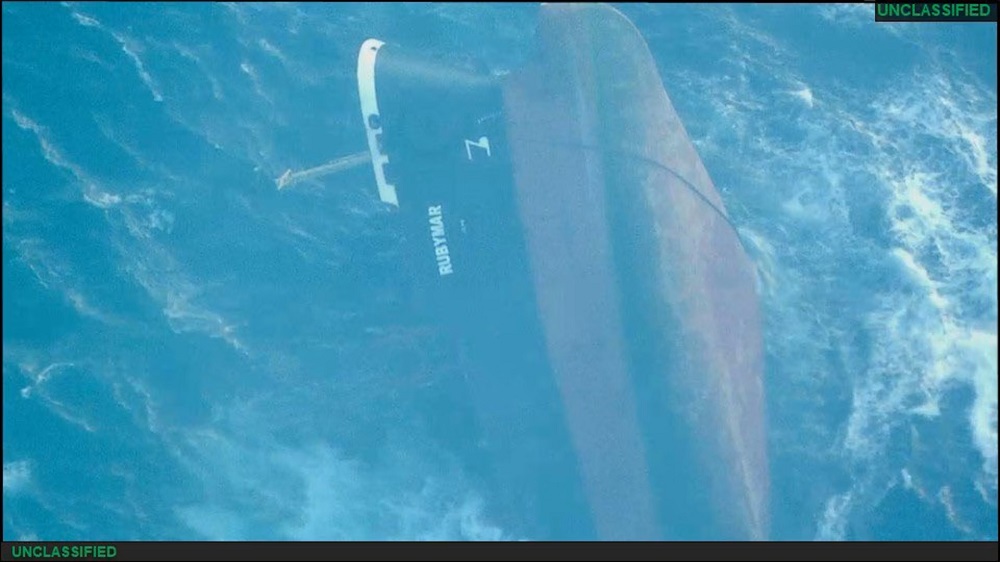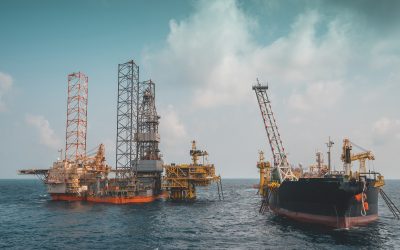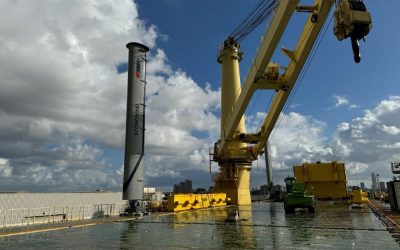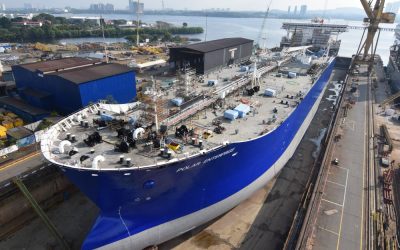The recent sinking of the Belize-flagged bulk carrier Rubymar in the Red Sea has further escalated tensions in the region and raised alarm bells over potential environmental damage. The vessel, carrying approximately 18,000 metric tons of ammonium phosphate sulphate fertiliser, sank after being struck by an Iranian-backed Houthi terrorist anti-ship ballistic missile on 18 February.
After being abandoned by its crew the vessel drifted northwards before it finally succumbed to the damage and went under on 2 March. A large oil slick has now been spotted in the area, hinting at a potential environmental catastrophe, in the aftermath of the incident.
In response to the crisis, the International Maritime Organization (IMO) has issued a statement urging immediate action to address the situation. Speaking at the opening of the tenth session of the IMO’s Sub-Committee on Ship Systems and Equipment (SSE 10), IMO Secretary-General Mr. Arsenio Dominguez highlighted the importance of protecting seafarers and preventing further escalation of the situation.
“The recent sinking of the vessel Rubymar represents an additional risk for the environment and maritime security. We are in contact with the Government of Yemen and other UN organisations to provide necessary assistance,” stated Mr. Dominguez.
Additionally, he again advocated for the release of the ro-ro car carrier Galaxy Leader and its crew, who have been imprisoned since 19 November 2023. “The first impact of this crisis, before it has an impact on trade, falls on seafarers. It is the responsibility of this Organization and its Member States to protect all seafarers,” said Mr Dominguez.
Rubymar’s sinking has not only heightened concerns about the delicate marine ecosystems in the area but has also triggered disruptions in global shipping routes. With the vessel posing both an environmental risk and a subsurface impact risk to other ships in the busy shipping lanes of the Red Sea, maritime authorities and shipping companies are on high alert.
In response to the sinking, the United States Central Command (USCENTCOM) issued a statement highlighting the threat posed by the ship’s cargo. The Red Sea, home to fragile marine ecosystems such as coral reefs, faces the threat of devastation if the ammonia fertiliser cargo leaks into its waters. Additionally, the possibility of other ships colliding with the sunken Rubymar further compounds the risks associated with navigating the Bab al-Mandab Strait.
The incident has already had significant repercussions on global shipping operations. Many commercial shippers have opted to divert their voyages to longer routes around the southern tip of Africa, avoiding the potentially hazardous waters of the Red Sea, but also risking attacks from Somali pirates in the Horn of Africa. Furthermore, insurance companies have ceased offering coverage for vessels choosing to transit through the Red Sea, reflecting the increased risks associated with the route.
Rubymar is the first vessel casualty in the Red Sea crisis, which has seen a series of attacks on ships since November. The attacks, believed to be orchestrated by Iran-backed Houthi militants, have targeted vessels linked to the United States, United Kingdom, and Israel. The motives behind these attacks remain tied to geopolitical tensions in the region, including the ongoing conflict between Israel and Hamas.
Efforts to salvage Rubymar were hampered by a lack of assistance from nearby ports, which has been attributed to ongoing threats from the Houthi militants. Despite appeals for help from ports in the UAE, Africa, Saudi Arabia, and Oman, salvage operations faced significant challenges, ultimately failing to yield any tangible results.
As the international community grapples with the aftermath of the sinking and the ongoing attacks on shipping in the region, further questions will no doubt be asked about the broader implications for maritime security and environmental protection in the Red Sea. With tensions in the region showing no signs of abating, stakeholders are urged to prioritise efforts to mitigate environmental risks and ensure the safety of maritime navigation in one of the world’s most strategically vital waterways.






